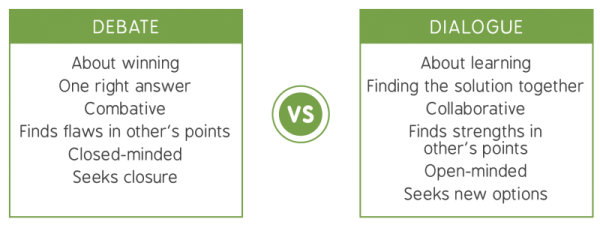Lesson 1: The Difference Between Debate and Dialogue
Jun 16, 2015
Before we branch out into how to facilitate a conversation, it will be helpful to understand that difficult conversations should include dialogue and stay away from becoming a debate. At the beginning of every LTL session that we conduct, we go over the basics of what debate and dialogue is so that participants understand the reason for being in the session. We are providing this information in order for you to take part in conversations with your peers about any issue in the community.
Debate
Maybe you have not taken a debate class or have never competed on a debate team. It is not only about public speaking and persuasion, but the overall goal is to win. It is a natural reaction to argue that there is only one right answer, which is of course what we believe. We may look at the other person in the conversation as an opponent. It is like going into combat – we are ready to fight with all we have. Quite a bit of heart goes into the act of debating. We look for any and every way to find flaws in our opponent’s argument and hope that our comeback rips their comments in half. When we debate, our minds are not open to our opponent’s beliefs. At the end of the debate, we look for closure that is in favor of our beliefs.
By all means, not every conversation that takes a debating style is as vicious. This visualization should help you understand the difference.
Dialogue
When we approach conversations as dialogues, understanding is a common goal between everyone involved. Participants take the challenge of the conversation as a learning opportunity. They work together to find strengths in each other’s views and work toward finding solutions to an issue. As communicators, we are open-minded in this type of conversation, and we look for the best options that will benefit everyone involved. Instead of just one party feeling like a victor, everyone walks away satisfied with the outcome of the conversation.
Here is a chart to help layout the differences:

Next time your colleague approaches you with a statement that you may not agree with, instead of debating them, take a stab at trying to understand why they feel the way they feel. Your interest in wanting to understand their statement will probably open up the opportunity for your colleague to ask how you may feel about the same topic. Give it a try!
Also read:
Jasmine Brown, Communications & Outreach Coordinator
Diversity Awareness Partnership